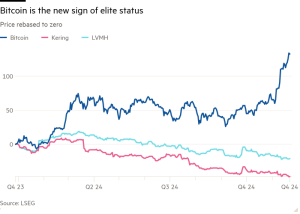EU ministers scramble to find a response to Middle East carnage
This article is an on-site version of our Europe Express newsletter. Premium subscribers can sign up here to get the newsletter delivered every weekday and Saturday morning. Standard subscribers can upgrade to Premium here, or explore all FT newsletters
Good morning. Austria’s far-right Freedom party (FPÖ) is projected to win a historic electoral victory in yesterday’s parliamentary election with just under 29 per cent of the vote. As our Europe editor writes, victory for the FPÖ, which has embraced increasingly hardline and extremist policies on immigration and the war in Ukraine, further consolidates pro-Russian, anti-establishment forces in central Europe.
Today, I reveal EU crisis talks on how to respond to a rapidly unravelling situation in the Middle East, and our Rome bureau chief reports on the surge of pro-Trump, pro-Russian rhetoric in Italy.
Carnage
EU capitals are organising an emergency meeting of foreign affairs ministers to respond to the rapidly escalating conflict in the Middle East, as Israel’s assault on Lebanon and the Hizbollah militant group ramped up during a weekend of devastating missile attacks.
Context: Israel’s bombardment of Lebanon over the past fortnight has killed more than 1,000 people. On Friday, a massive missile strike on southern Beirut killed Hizbollah’s leader Hassan Nasrallah. Israel also widened the conflict with attacks on Iran-backed Houthis in Yemen yesterday.
EU diplomats and officials, whose calls for a ceasefire and de-escalation have been ignored by Israel, were last night working to arrange a virtual meeting of the bloc’s foreign affairs council, people familiar with the talks said, with some pushing for a discussion as soon as today.
Separately, the European Commission yesterday released €10mn in additional humanitarian aid to Lebanon, which it said would provide “the most urgent needs such as protection, food assistance, shelter and healthcare”.
The new tranche takes the EU’s total humanitarian aid to Lebanon this year to €74mn.
Israeli Prime Minister Benjamin Netanyahu this weekend insisted that Israel’s “work has still not been completed” and that his armed forces would continue to attack Iran-backed militants until it had succeeded in “changing the balance of power” in the region.
“There is no place in Iran or the Middle East that the long arm of Israel cannot reach,” Netanyahu said.
EU capitals have in recent days repeated their pleas for citizens still in Lebanon to evacuate as soon as possible, and some are drawing up contingency plans for emergency evacuations.
Chart du jour: Downward slope

The ECB is expected to cut rates again next month, according to economists’ predictions, in response to a string of recent indicators pointing to the Eurozone’s slowing growth.
Billboards in Rome
Italian Prime Minister Giorgia Meloni has been a staunch supporter of Ukraine’s battle against Russian aggression. But not all Italians share her zeal, writes Amy Kazmin.
This weekend, deputy premier Matteo Salvini expressed hope that Donald Trump would win the upcoming US presidential elections — to bring a quick end to conflict.
Context: The EU has stood firmly behind Ukraine in its fight against Russia, but pro-Russian voices have slowly grown and could be encouraged by Trump’s re-election. Czech former premier Andrej Babiš has also expressed his support for Trump. A comeback for him in elections next year could cement Europe’s illiberal flank led by Hungary and Slovakia.
Salvini, who is a longtime Putin admirer, echoed those sentiments.
“Because for me war is horrible, I hope the Republicans win,” Salvini said. “This is my personal opinion . . . Whoever will contribute to the end of the conflict that brings death, destruction and hunger to Russia and Ukraine, I will be happy.”
He also said Italian weapons sent to Ukraine “cannot be used to unleash World War III bombing and killing in Russia”. Rome has donated SAMP-T air defence systems to Kyiv.
Meanwhile, mysterious billboards have gone up in a dozen Italian cities over the past days proclaiming “Russia is not an enemy” and urging Rome to halt military support for Kyiv. Authorities are investigating who put them up.
Beniamino Irdi, a senior fellow at the Atlantic Council, said Russia and its supporters were eager to stoke public opposition to support for Ukraine.
“The Russians have been fighting two wars — one is the military effort on the ground, and the other is the cognitive and propaganda campaign against the west,” Irdi said. “Italy is one of the hottest fronts because it is perceived by Russia as a weak link in the chain.”
What to watch today
-
French far-right leader Marine Le Pen goes on trial over accusations of embezzling EU funds.
-
UK minister for EU relations Nick Thomas-Symonds meets commission executive vice-president Maroš Šefčovič in Brussels.
-
Mario Draghi discusses his EU competitiveness report in conversation with Bruegel, from 1230.
Now read these
Recommended newsletters for you
Trade Secrets — A must-read on the changing face of international trade and globalisation. Sign up here
Swamp Notes — Expert insight on the intersection of money and power in US politics. Sign up here
Are you enjoying Europe Express? Sign up here to have it delivered straight to your inbox every workday at 7am CET and on Saturdays at noon CET. Do tell us what you think, we love to hear from you: [email protected]. Keep up with the latest European stories @FT Europe
#ministers #scramble #find #response #Middle #East #carnage




